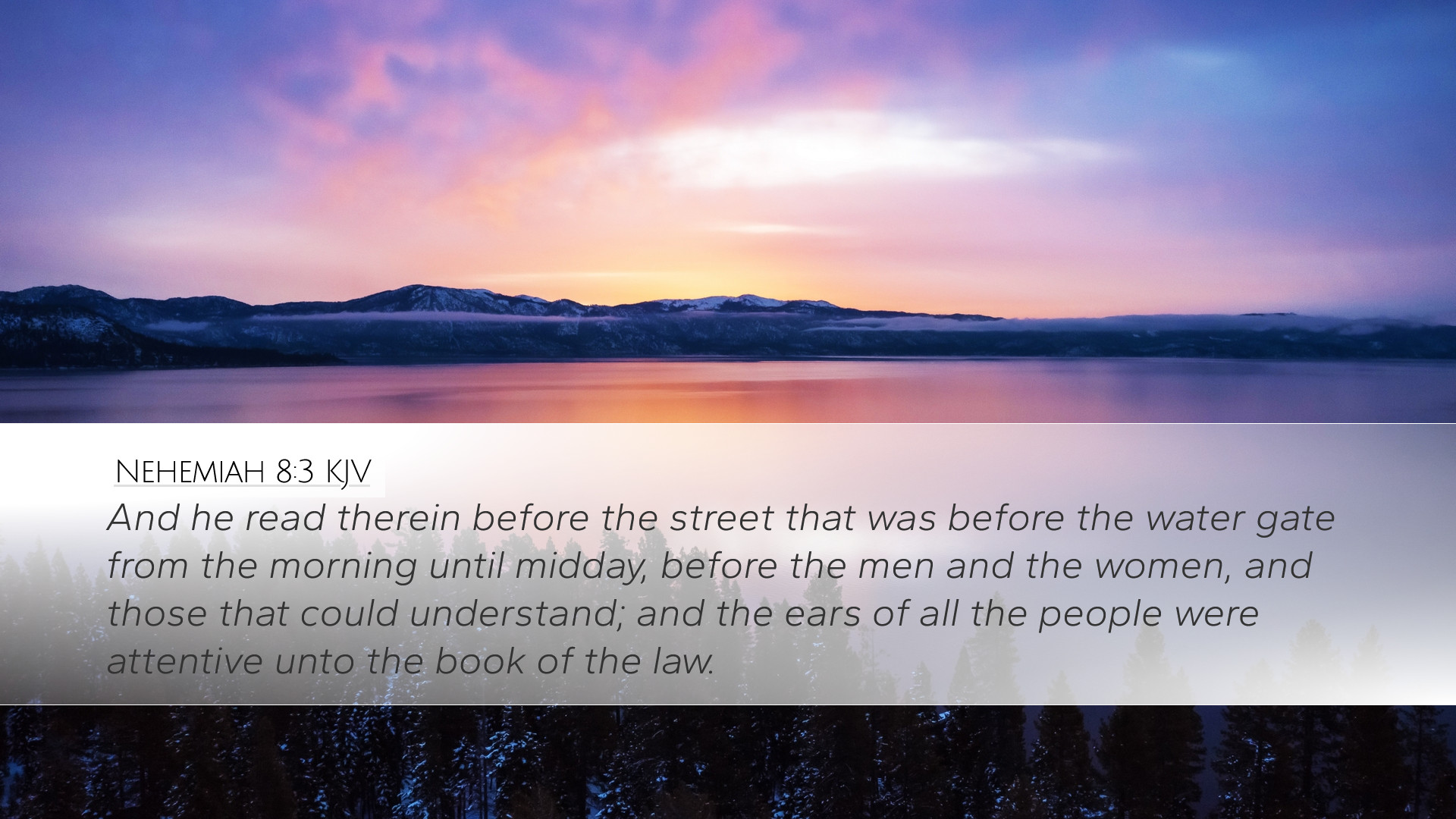Old Testament
Genesis Exodus Leviticus Numbers Deuteronomy Joshua Judges Ruth 1 Samuel 2 Samuel 1 Kings 2 Kings 1 Chronicles 2 Chronicles Ezra Nehemiah Esther Job Psalms Proverbs Ecclesiastes Song of Solomon Isaiah Jeremiah Lamentations Ezekiel Daniel Hosea Joel Amos Obadiah Jonah Micah Nahum Habakkuk Zephaniah Haggai Zechariah MalachiNehemiah 8:3
Nehemiah 8:3 KJV
And he read therein before the street that was before the water gate from the morning until midday, before the men and the women, and those that could understand; and the ears of all the people were attentive unto the book of the law.
Nehemiah 8:3 Bible Commentary
Commentary on Nehemiah 8:3
Nehemiah 8:3 (ESV): "And he read from it facing the square before the Water Gate from early morning until midday, in the presence of the men and the women and those who could understand. And the ears of all the people were attentive to the Book of the Law."
Introduction
The significance of Nehemiah 8:3 cannot be understated, as it marks a pivotal moment in the restoration of God’s people. Here we see a gathering of the Israelites, attentive to the reading of the Law, evidencing a collective reverence for Scripture. This commentary synthesizes the insights from several public domain sources to provide a comprehensive understanding of this verse, aiming to enrich the spiritual lives of pastors, students, and theologians.
Contextual Framework
To fully appreciate this verse, one must consider the historical context. After the Babylonian exile, the people of Israel are returning to Jerusalem under Nehemiah's leadership. The reading of the Law is an essential act of cultural and spiritual renewal, reminding the people of their identity and covenant with God.
Historical Background
As noted by Albert Barnes, the situation in Jerusalem was one of re-establishing order and worship. The Law of Moses, having been neglected during the Babylonian captivity, needed to be brought back to the forefront of their communal life. This reading signifies an awakening of faith among the returned exiles.
Exegesis of Nehemiah 8:3
Matthew Henry provides valuable insights regarding the significance of the physical act of reading. He notes that Nehemiah chose a public space — "the square before the Water Gate" — which emphasizes the communal nature of the gathering. The choice of time, from early morning until midday, reflects the people's eagerness to hear the Word of God, which speaks volumes about their hunger for spiritual nourishment.
The Practice of Reading Scripture
- Public Reading: The act of publicly reading Scripture serves not only as a means of instruction but also as a visible act of worship and unity. Adam Clarke indicates that such practices weave together community and doctrine.
- Attentiveness: "The ears of all the people were attentive" speaks to the result of godly leadership. Their attentiveness was a reflection of the seriousness with which they regarded God's Word, fostering an environment where the Spirit could work effectively.
The Role of Community in Scripture Reading
The gathering included "men and women and those who could understand," suggesting that the reading was inclusive and aimed at all who were willing to listen. This aligns with Matthew Henry’s observation that God's message is universal, transcending gender and age. It shows that engagement with Scripture is a collective endeavor.
Theological Implications
This verse highlights several key theological themes:
- Authority of Scripture: It underscores the authority of God's law as central to the community's identity and governance. The return to Scripture reflects a desire for divine guidance.
- Restoration: The returning exiles were not just rebuilding walls but reestablishing their relationship with God, which starts with an understanding of His Word. Nehemiah 8:3 embodies the truth that spiritual restoration begins with engagement in Scripture.
Practical Applications
For pastors and leaders today, several applications can be derived from Nehemiah 8:3:
- Encouraged Public Engagement: Promote public reading and engagement with Scripture within congregations. This act can draw communities closer together while strengthening their faith.
- Fostering Attentiveness: Create environments where congregants are encouraged to listen actively to the reading and preaching of Scripture, both in formal services and informal settings.
- Inclusive Teaching: Ensure that teaching efforts target diverse groups within the church, making the Word accessible to everyone regardless of age or background.
Conclusion
Nehemiah 8:3 serves as a powerful reminder of the transformative power of Scripture in the life of the believer and the community. By studying this verse, we witness the joy of returning to God's Word after a period of exile and confusion, and the communal responsibility to uphold and cherish that Word. The insights from Matthew Henry, Albert Barnes, and Adam Clarke guide us to a deeper understanding of the role that Scripture plays in restoration, community-building, and personal growth.
Final Reflection
As we meditate on Nehemiah 8:3, let us not forget the importance of our own attentiveness to the Word of God. In a world full of distractions, may we gather our hearts and minds to listen to what He has to say, acknowledging the profound effects of His Law on our lives and the life of the church.


